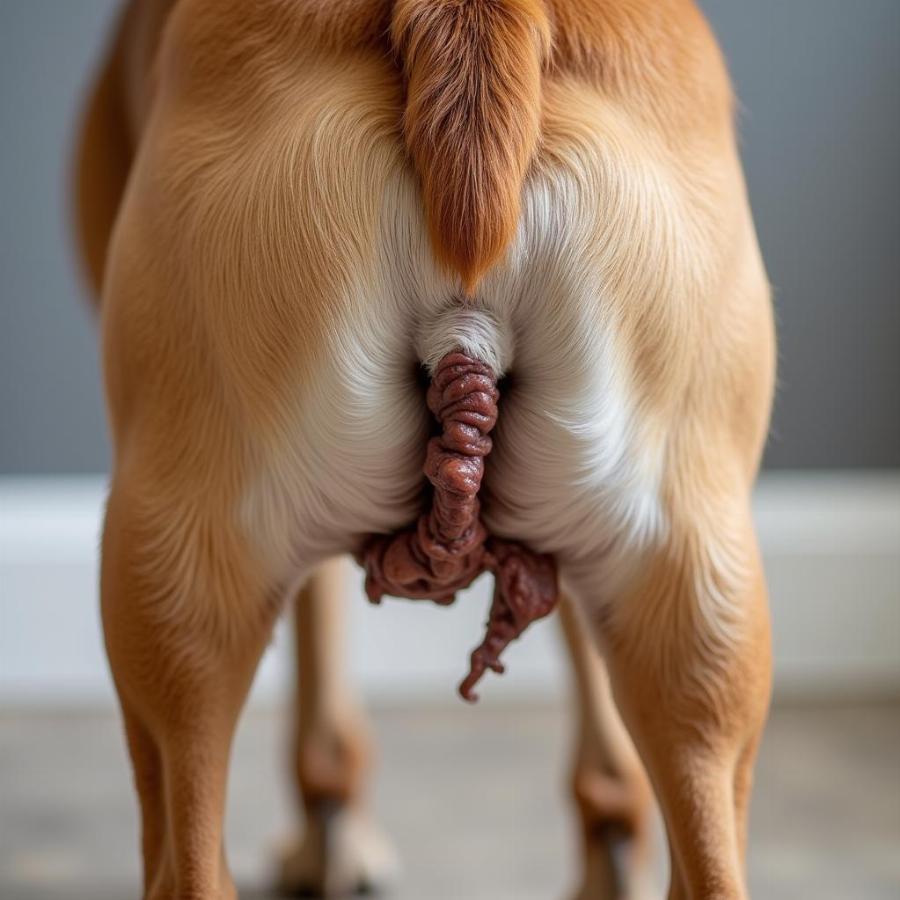Diarrhea is a common canine ailment, often causing discomfort and worry for pet owners. While a single episode of loose stools might not be cause for alarm, persistent diarrhea in dogs requires attention. This guide explores the common causes of diarrhea in dogs, home remedies, when to seek veterinary help, and effective ways to help your furry friend get back to their playful self.
Understanding the Causes of Diarrhea in Dogs
Determining the cause of your dog’s diarrhea is crucial for effective treatment. Here are some common culprits:
- Dietary Indiscretion: This is a common cause, often stemming from dogs ingesting something they shouldn’t, like garbage, spoiled food, or even a sudden change in diet.
- Parasites: Intestinal parasites such as roundworms, hookworms, and whipworms can wreak havoc on a dog’s digestive system, leading to diarrhea.
- Infections: Viral or bacterial infections can cause inflammation in the gut, resulting in diarrhea.
- Stress or Anxiety: Just like humans, dogs can experience stress-induced digestive upset. Changes in routine, travel, or even loud noises can trigger diarrhea in some dogs.
- Food Allergies or Intolerances: Sensitivity to certain ingredients like wheat, soy, or dairy can cause an adverse reaction in the gut, leading to diarrhea.
- Medical Conditions: Inflammatory bowel disease (IBD), pancreatitis, and kidney or liver disease can also manifest as diarrhea.
 Dog showing symptoms of diarrhea
Dog showing symptoms of diarrhea
Home Remedies for Dog Diarrhea
If your dog’s diarrhea is mild and they’re otherwise acting normal, you can try these home remedies:
- Fasting: Withhold food for 12-24 hours to allow the digestive system to rest.
- Bland Diet: After fasting, introduce a bland diet of boiled chicken and rice (without any seasonings) in small, frequent meals.
- Probiotics: Adding probiotics specifically formulated for dogs can help restore the balance of good bacteria in the gut.
- Hydration: Diarrhea can lead to dehydration, so ensure your dog has access to fresh water at all times. You can also offer them low-sodium chicken broth or Pedialyte (as directed by your vet) to encourage fluid intake.
When to Seek Veterinary Care
While home remedies can be helpful, it’s important to know when your dog’s diarrhea warrants a trip to the veterinarian. Seek immediate veterinary care if:
- Diarrhea persists for more than 24 hours, especially in puppies.
- Your dog is exhibiting other symptoms such as lethargy, vomiting, loss of appetite, blood in the stool, or black, tarry stools.
- Your dog appears weak or dehydrated.
“It’s always better to err on the side of caution,” says Dr. Emily Parker, a veterinarian with over 15 years of experience. “Diarrhea can be a sign of something more serious, so it’s important to have your dog examined by a professional if their condition doesn’t improve or worsens.”
Diagnosing the Cause of Diarrhea
Your veterinarian will likely ask you a series of questions about your dog’s history, symptoms, diet, and lifestyle. They may recommend diagnostic tests such as:
- Fecal Exam: This checks for the presence of parasites.
- Blood Tests: These can help rule out underlying medical conditions.
- Abdominal X-rays or Ultrasound: These imaging tests can help visualize the digestive tract and identify any abnormalities.
Treatment Options for Dog Diarrhea
Treatment for diarrhea will depend on the underlying cause. Your veterinarian may recommend:
- Anti-parasitic medication: If parasites are detected, your vet will prescribe an appropriate deworming medication.
- Antibiotics: If a bacterial infection is present, your vet will prescribe antibiotics.
- Dietary Changes: Switching to a hypoallergenic diet or prescription food may be necessary for dogs with food allergies or intolerances.
- Medications to Manage Symptoms: Your vet may prescribe medications to help reduce inflammation, control diarrhea, and ease any discomfort.
Preventing Dog Diarrhea
While not all cases of diarrhea are preventable, here are some measures to help reduce the risk:
- Avoid feeding table scraps.
- Store garbage securely and keep it out of your dog’s reach.
- Keep your dog on a consistent, high-quality diet.
- Schedule regular vet check-ups and fecal exams to detect and treat parasites.
- Clean up your dog’s waste promptly, especially in areas frequented by other dogs.
- Wash your hands thoroughly after handling your dog’s waste.
Conclusion
Diarrhea is a common canine health concern, but with prompt attention and proper care, most dogs recover quickly. Remember, early detection and treatment are key to preventing complications. If your dog experiences diarrhea, monitor their symptoms closely, and don’t hesitate to contact your veterinarian for guidance.
Need more support? Contact Beaut Dogs at [email protected] for detailed and accurate information.
Beaut Dogs is your ultimate destination for dog lovers and owners, offering reliable, helpful, and in-depth information about the canine world.
FAQs
1. Can I give my dog Imodium for diarrhea?
It’s not recommended to give human medications to dogs without consulting your veterinarian. Some human medications can be toxic to dogs.
2. When should I be concerned about blood in my dog’s stool?
Blood in your dog’s stool is always a cause for concern and warrants immediate veterinary attention.
3. Can stress really cause diarrhea in dogs?
Yes, just like humans, dogs can experience stress-induced digestive upset, which can manifest as diarrhea.
4. What are some good probiotic options for dogs with diarrhea?
Ask your veterinarian for recommendations on probiotic brands and formulations that are appropriate for your dog’s size and needs.
5. How can I prevent my dog from getting parasites?
Regular vet check-ups, fecal exams, and preventative deworming medication can help protect your dog from intestinal parasites.